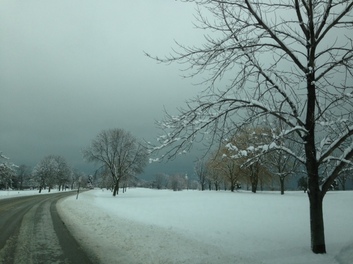in lasting lace curtains,
silent sleep to afflict us,
cast against us, white sleet
in our squinting eyes.
It falls,
a dark winter sky disgorging
cover for brooding elders
watching our slow-motion progress
on the plains below,
their breath the ice of forgotten Northern witch-realms,
their touch leaving white fingerprints
on our moods.
It falls
to cover what we cannot see,
the Walker in the Wind,
face cast down against stinging ice drops,
our own thoughts wrapped in his
downcast snowblind eyes
shut tight for the cold,
bare footprints quickly erased by a swirl,
by deliberate wind
in the winter landscape of our cruelty.
It falls.
In the end, the peace of a thousand fallen Princes
mailed chests
rusted shut.
Victory forgotten but for the play
of a young hooded child, tentative red mittens
in the white depth of it all.
It falls
as a beautiful cleansing,
a virgin white
on the sexless arms of sleeping trees,
a frozen baptism
if we but become
the Walker, ourselves.
It falls
so we no longer do,
so in a month or two
the sun can rise.


 RSS Feed
RSS Feed
